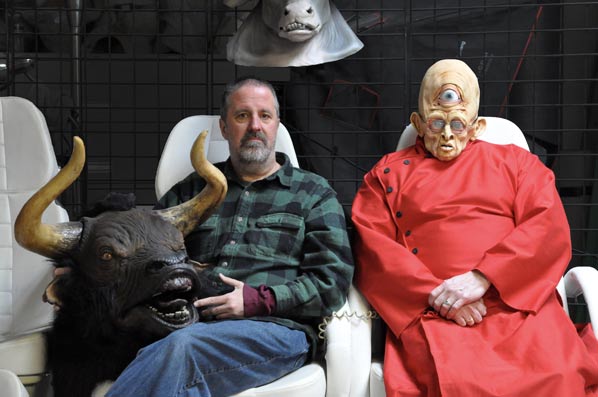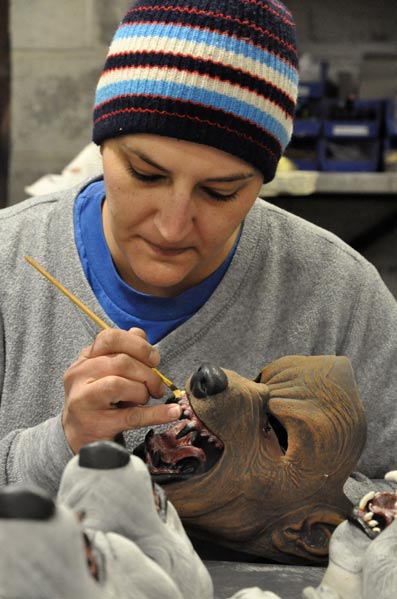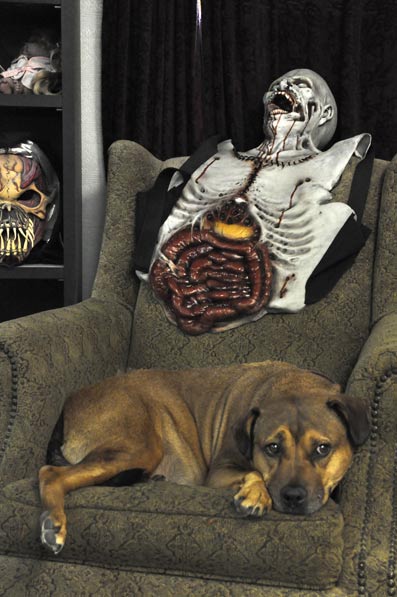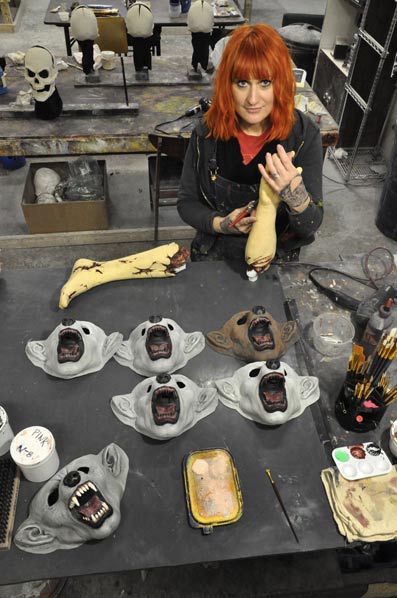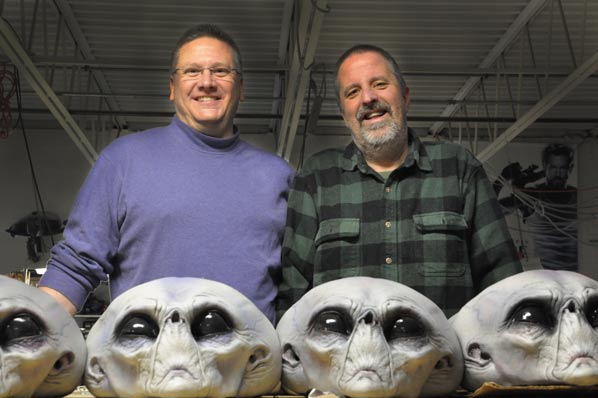The MTV show Rob Dyerdak's Fantasy Factory just aired an episode that involved cast members in tiger, leopard and panther costumes.
A member of the rock band The Flaming Lips recently donned a bear costume to perform their song Bear on stage.
The cat and bear costumes — as well as two more bear costumes that will appear in a Volkswagen commercial to air in the United Arab Emirates and a bear's head that recently appeared on the cover of Bloomsburg Business Week — all hail from a warehouse located on a secluded side street in Sharpsburg. The warehouse is headquarters of Specter Studios, a small-but-growing operation that is quickly gaining a reputation as the go-to place for hand-crafted and rather spectacular wings, face masks, costumes, and other creature and body appendages.
You have to see them to believe them.
“Our products were in some short films for the Burning Man Festival and a theater in Iceland recently purchased two of our Roswell masks,” says Mark Marsen, a co-owner of Specter who oversees the day-to-day operations.
In this corner of the commonwealth that proudly claims “Night of the Living Dead” and “Master of Splatter” Tom Savini as its own, Specter Studios is establishing itself as a quality purveyor of horror for many reasons. Chief among them is that Marsen and co-owner Scott Tyson have established a dual mission: to craft a high-quality product while creating a stable-yet-creative work environment for their employees.
Their efforts have resulted in a small but loyal group of artist-employees, and a designation as one of the Top 60 places to work in Pittsburgh in 2010 and a second nomination for 2011.
“The arts are really important in cities. They create a vibrant youth culture,” explains Tyson, a Mt. Lebanon physician who runs Pediatric South where Marsen also works as head of human resources.
What's their secret for their high employee satisfaction? Both Marsen and Tyson say there are no bells or whistles, just a combination of sincerity and respect for their employees. More than anything, employees want a boss who will listen.
“You never say, 'That's not a good idea,'” Tyson says.
Although they are small but growing, Specter pays for 80 percent of all medical insurance costs and 100 percent of vision and dental coverage for employees.
Their efforts have paid off in a loyal cadre of employees upon whose nominations (as well as other factors) the best place to work designation is based.
The History
Marsen and Tyson have always done it up huge at Halloween; several years ago they decided their collection of high-end decorations might work well in a haunted house.
“We were looking for a building that we could do a haunt in,” Marsen explains. “When it comes to decorating, we would do at Halloween what most people would do for Christmas.”
In search of a building to transform, they came across Specter Studios, located at the time on Washington Boulevard in the City's East End. Instead of starting a haunted house, they began re-envisioning the company as a business that would produce high quality masks, appendages and costumes while allowing local artisans to stay local.
One realization Marsen and Tyson had was that this venture, at least initially, could wipe out their retirement savings. “There was a lot of discussion before we said yes to this. We went into this knowing as much as we could,” Marsen says. Armed with this knowledge, they decided to pass on the building, and instead simply purchased the business in March of 2004 and relocated to Sharpsburg.
Slowly but steadily business has increased and Specter products now fill the shelves in six of seven continents. “With any luck, the seventh will be conquered soon,” Marsen says.
In the meantime, Marsen is looking to expand its presence locally. Specter will serve as the official “Limbs and Weapons Sponsor” for Evening in Quarantine: The Zombie Opera, held October 27 – 30 at Graybox Theater in Lawrenceville. This past year, Specter has also hosted art shows at Modern Formations, a Lawrenceville gallery, where four company artists were given two masks and free rein to customize them however they chose.
Plans are also underway for “Art Throb,” an artistic open house to be held in early December at the Specter headquarters on South Canal Street. Art of all kinds from employees past and present will be on display.
Marsen, who oversees day-to-day operations at Specter, says one of his favorite aspects is the new product brainstorming sessions where employees discuss successes/failures and try to come up with ideas for this year's “wow” product.
“I remember one year we were talking about whether we should do a heart or intestines and we said 'Everyone has a heart, let's go with the intestines,'” Marsen says.
The latest “wow” is the minotaur, a creature from Greek mythology with the head of a bull and the body of a man.
This year Specter introduced the Creepy Doll Stocking Mask, which was inspired by an old wooden doll that Marsen's sister had when they were young.
“I poked the eyes out. For many decades after, it was this wooden doll with these black spaces where the eyes should have been. The teeth and tongue also moved. I would have friends over and they would get creeped out by it,” he says. In other words, it was the ideal inspiration for Specter.
Most items are sold through the company's website, but local customers can call beforehand if they'd like to stop and pick up some spooky wares for the upcoming Halloween holiday.
Every year, Marsen likes to tweak the business model and this year he will focus on customizing items. For example, if a customer wants a mask not in blue but in a dead-flesh tone, Specter artists will try to accommodate. Marsen says he was inspired by a request he received from one of Hugh Hefner's Playboy Bunnies a few years back. If you watched “The Girls Next Door,” you'll recognize her as Bridget Marquardt, one of Hef's girls who especially loved Halloween.
“She contacted us and wanted to know if we could make her the dragon wings in a dead-flesh color scheme,” explains Marsen. “I said 'Oh gosh, yes.'”
Everything in House
Another strategic imperative for Marsen and Tyson is that all the work—from the production of masks and costumes to catalogs and commercials—be done in-house.
The production of limbs, masks and other body parts takes place on first floor. Each piece begins as a clay sculpture, which, after several iterations, is transformed into a plaster mold for production. Latex is then poured into the molds, which then drain or absorb the moisture, curing the latex into the desired shape of the mask or body part, Marsen explains.
“It's a completely natural process. We don't have to bake or add any chemicals. The latex comes to us in big barrels. Other than tinting it, we don't do that much to it,” he explains.
The second floor of the warehouse performs triple duty as a costume-sewing area/photography and video studio and/business office.
Marsen and Tyson also stay local when hiring, and recruit from local art schools. “There's no reasons that those kids have to go to Los Angeles, Toronto or New York to work if they want to stay in Pittsburgh,” Marsen explains.
Photographs copyright Brian Cohen
Scott Tyson (left) and Mark Marsen
(former employee) Carrie Petrich
Ralphus (the dog)
Ianna Holten
Marsen (left) and Tyson.

